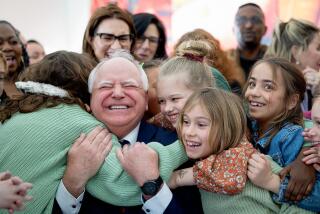A Choice That Reveals the Real President
WASHINGTON — According to a well-placed Republican source, Sen. Bill Frist was desperately hoping that Marc Racicot would run for the U.S. Senate, right up until Racicot was made the new head of the Republican National Committee. Frist, chairman of the National Republican Senatorial Committee, thought Racicot, a wildly popular former governor of Montana, was a cinch to defeat Democrat Max Baucus next year, which would help the party retake the Senate.
Instead, President Bush tapped Racicot to succeed Virginia Gov. Jim Gilmore at the RNC. There was some disappointment in GOP circles over the party’s performance in recent elections. Some members of the administration were particularly upset when Democrat Mark Warner won the governorship of Virginia. And some Bush loyalists speculate that Gilmore never really fit in with the Texas crowd in the White House, because he wasn’t solely loyal to the president. “The rap on Gilmore,” says one political observer, “was that he had his own agenda, and that’s the worst crime in the Bush White House. ... Gilmore violated the cardinal code, and hence he ‘wants to spend more time with his family.’”
So, why did Bush pick Racicot? It’s tempting to read deeply into the selection and look for signs that the president is trying to shape the ideological makeup of the party. After all, even though Bush ran as a staunch conservative, many of his appointments--Colin L. Powell, Christine Todd Whitman and Roderick Paige, for example--have been surprisingly moderate. Add to this list the selection of Tom Ridge as director of the Office of Homeland Security in October and now the moderate Racicot as RNC chief, and it’s easy to see a trend.
It’s also reasonable to think that Bush may have felt that he owed Racicot. The former governor was front and center as a Bush defender during the acrimonious Florida recount. After the U.S. Supreme Court settled the presidential election, Bush wanted Racicot to be his attorney general, but Racicot withdrew his name after social conservatives, unsure of his pro-life bona fides, waged a fierce attack on him. Bush subsequently made John Ashcroft his man at Justice. Something similar happened to Ridge. Bush and Ridge are close friends, and the president thought long and hard about offering him the vice-presidential slot. Ridge’s liability with Catholic voters, however, made the Bush team uneasy, and eventually Bush settled on Dick Cheney. A little over a year later, Ridge got his post.
But there’s an even simpler explanation for putting the former governor in charge of the RNC: Bush likes Racicot. More important, he trusts him. The two became friends in the late 1990s when both were active in the Republican Governors Assn. It was Racicot who first circulated the petition among GOP governors to draft Bush for the 2000 election.
During the election recount, Racicot and Bush sometimes jogged together. They’re both casual, plain-spoken men who like sports (Bush owned a baseball team, Racicot played college basketball) and prefer civility to hot rhetoric.
“They have good chemistry,” says Marshall Wittmann, a senior fellow at the Hudson Institute.
And having a good relationship with the president is an important asset for an RNC director these days. The president always runs his party, making the national committee chairman mostly a worker bee. As one politico commented, “Karl Rove runs the RNC, anyway, so what’s the difference?”
Racicot, who’s more Haley Barbour than Jim Nicholson or Gilmore, gives Bush another trusted spokesman, someone to go on the Sunday talk shows and help get the administration’s message out, something at which Racicot has already proved himself adept. For better or worse, the president seems to think that this task is more important than controlling the U.S. Senate.
There is some quiet talk, which Bush officials vehemently deny, that Racicot--and Ridge, for that matter--is auditioning. Cabinet jobs will undoubtedly open up in the next two years, and while Bush wasn’t comfortable with insisting on his first choices before his inauguration, he’s a proven leader now, with job-approval ratings around 80%. He’ll be able to get his way on future appointments.
But there might be bigger game than Cabinet positions. Cheney has been an exceptional vice president, but there is always the possibility that his health will preclude his running for reelection. Racicot is an attractive politician who embodies “compassionate conservatism” every bit as much as Bush does. If he raises his profile and does well in the coming months, he would have to top anyone’s short list for vice president.
When asked about this, one high-ranking Bush staffer dismissed it out of hand. “Bush--and this goes back to 41 (Bush’s father, the 41st president)--isn’t the audition type. He has jobs that need to be done, and so long as there’s someone in the family who can do it, he gives it to them.”
So, why Racicot? Is he an ideological signal? A favor? An audition?
As Wittmann says, “Three reasons: Loyalty, loyalty and loyalty.” It’s Bush’s Razor: When in doubt, the simplest explanation is always loyalty. And it’s almost always the truth.
*
Jonathan V. Last is online editor of The Weekly Standard.
More to Read
Get the L.A. Times Politics newsletter
Deeply reported insights into legislation, politics and policy from Sacramento, Washington and beyond. In your inbox three times per week.
You may occasionally receive promotional content from the Los Angeles Times.










